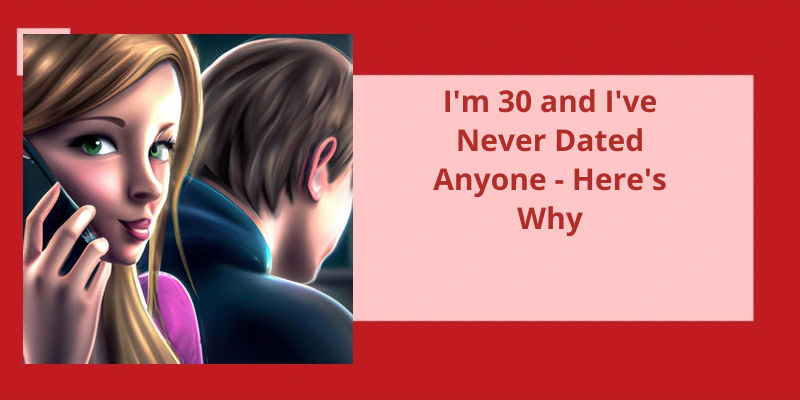Embarking on the journey of dating can be exciting yet daunting. It requires a level of vulnerability and bravery that may not come naturally to everyone. One might think that by the time they reach their 30s, they’d have experienced at least one romantic relationship or gone on a few dates. However, that isn’t always the case, and it's important to remember that it's perfectly normal. Society often places an emphasis on finding love and settling down by a certain age, but the truth is that everyone's path is unique. Whether you've never dated or have had unsuccessful experiences in the past, there's no need to feel ashamed or embarrassed. With the right mindset, genuine intentions, and a willingness to take chances, anyone can find love and companionship.
Is It Normal to Have Never Dated in Your 20s?
There’s no right or wrong age when it comes to starting a romantic relationship. Some people may find their life partner in their high school sweetheart while others may find their soulmate in their 30s or beyond. In todays fast-paced world, where everyone seems to be focused on their career, education or personal goals, it’s completely normal to not have dated anyone in your 20s – and theres nothing wrong with that.
Some people may feel pressured to start dating because of societal expectations or peer pressure. They may feel like theyre missing out on something by not being in a relationship. However, it’s important to remember that everyones journey is different, and theres no right or wrong way to live your life. It’s okay to be single and focus on yourself, your goals, and your personal development.
Being single in your 20s gives you the opportunity to learn more about yourself, your likes and dislikes, and what you want out of life. It allows you to focus on your goals without any distractions, and to develop a strong sense of self-worth and independence. When the time comes for you to pursue a romantic relationship, youll be more confident and self-assured, and youll have a better idea of what you want in a partner.
Whether youre single or in a relationship, it’s important to remember that your worth isn’t determined by your relationship status. The most important thing is to be true to yourself and live your life according to your own values and beliefs.
Finding Love After 30: Why Waiting Might Be Worth It
- Take the time to figure out what you really want in a partner.
- Focus on building a fulfilling life for yourself outside of a relationship.
- Invest in your friendships and social life.
- Be open to meeting new people, but don’t feel pressured to settle down.
- Don’t shy away from dating apps or online dating sites.
- Remember that finding love isn’t a race or a competition.
- Embrace your independence and enjoy the journey.
The concept of being single in your 30s often gets a bad reputation. However, it’s important to note that being single doesn’t define your worth or happiness. While it may not be the path you anticipated, it’s important to live in the present and embrace your current situation. In fact, being single in your 30s can be an empowering and liberating experience. So let’s take a closer look at the benefits and challenges of being single in your 30s.
Is 30 Too Old to Be Single?
There’s no age limit or deadline to find love or get into a committed relationship. Society has imposed certain expectations on individuals to reach certain milestones within a specific timeline, but this doesn’t mean that everyone has to follow the same path. Being single in your 30s isn’t a sign of failure or a cause for concern. It’s simply a choice or a circumstance that you’re currently experiencing.
One of the perks of being single in your 30s is having more time and freedom to focus on your personal growth and career goals. You can travel without any restrictions, learn new skills, and pursue your passions without having to compromise with a partners preferences or schedule. This is an excellent opportunity to invest in yourself and become the best version of yourself before settling down.
Moreover, being single also allows you to be more selective and picky when it comes to finding a suitable partner. You’ve more life experiences, knowledge, and self-awareness to know what you want and what you don’t want in a relationship. This can help you avoid getting into toxic or unfulfilling partnerships and instead be open to finding someone who complements your lifestyle and values.
However, being single in your 30s can also come with some challenges and societal pressures. People around you may ask uncomfortable questions or make assumptions about your relationship status or sexual orientation. It’s important to remember that their opinions don’t define you, and you’ve the right to live your life on your own terms.
The Benefits of Being Single in Your 30s for Men and Women
- Freedom to focus on personal growth and development
- Opportunities to travel and explore the world independently
- Time to build a strong career without compromising on personal life
- Ability to pursue hobbies and interests without external constraints
- Flexibility to make spontaneous decisions and take risks
- Chance to build deep and meaningful friendships
- Less pressure to conform to societal norms and expectations
- Opportunity to learn about oneself and find personal fulfillment
- Greater sense of self-awareness and independence
- The ability to create a fulfilling and enjoyable life on one’s own terms.
While many people may have experienced a romantic relationship at some point in their lives, there are those who’ve never had the chance to do so. Surprisingly, a good number of never-married singles, especially those who’re 40 years and older, reveal that they’ve never been in a relationship. In fact, the statistics may come as quite a shock considering the relatively large percentage of people who’ve missed out on dating altogether.
What Percentage of People Never Date Anyone?
Dating and relationships have been a fundamental part of human interactions for centuries. However, despite their importance, not everyone has had the chance to experience these aspects of life. According to recent research, a significant percentage of the population never dates anyone. Specifically, about 21% of never-married singles aged 40 and over have never been in a relationship. This is a considerable number of individuals who’ve had limited exposure to romantic encounters.
This suggests that dating patterns may be changing, and more people are delaying or avoiding the pursuit of romantic relationships altogether. It’s uncertain why this could be the case, but societal changes, such as changing gender roles, could be contributing factors.
The inability to form romantic connections has consequences that can affect ones mental and social well-being. Not having romantic experiences could lead to feelings of loneliness or isolation, especially in social situations where being single can make a person feel like an outsider. On the other hand, some people may choose not to pursue romantic relationships, preferring to focus on other life goals. This is a valid choice that should be respected, and they can find support among like-minded individuals.
Age is just a number when it comes to matters of the heart. While some may argue that there’s a certain age limit to dating, the truth is that it varies greatly from person to person. Just because someone is 28 and interested in a 21-year-old doesn’t mean it’s wrong or inappropriate. As long as both parties are consenting adults and share a genuine connection, there’s no reason why age should be a factor in their relationship.
Is 28 Too Old to Date 21?
There are many factors that can play into the success or failure of a relationship, regardless of age difference. It’s important to consider what each person wants out of the relationship and whether they’re at similar points in their lives. Are they looking for a long-term commitment or just a casual fling? Do they’ve compatible values and interests? These are important questions to ask before embarking on any relationship, regardless of age.
Additionally, it’s important to consider the potential impact of societal norms and expectations on the relationship. Some people may judge or criticize a couple with a significant age difference, which can add unnecessary stress and tension to the relationship. However, if both parties are secure in their love and committed to each other, they can navigate any external obstacles and create a fulfilling relationship.
Ultimately, age is just a number, and what matters most in a relationship is mutual respect, trust, and communication. As long as both parties are consenting adults and are on the same page about their expectations and intentions, there’s no reason why a 28 year old man and a 21 year old woman can’t date happily and successfully.
Of course, it’s also important to be aware of any legal implications of the relationship. In some jurisdictions, there may be age of consent laws that come into play for sexual activity, so it’s important to educate oneself about these laws before engaging in any sexual behavior. Additionally, it’s important to be aware of age discrimination laws in the workplace or other settings where age may be a factor.
In all, age shouldn’t be a determining factor in ones ability to date someone else. As long as both parties are happy and fulfilled in the relationship, that’s what matters most. It’s important to be open-minded and non-judgmental when it comes to matters of the heart, and to always treat each other with kindness, respect, and love.
Dealing With Criticism and Judgement From Family and Friends About the Age Difference.
When dealing with criticism and judgment from family and friends about an age difference in a relationship, it’s important to communicate openly and listen to their concerns. Ultimately, the decision is yours and your partner’s, but it can be helpful to try to understand where others are coming from and address any issues they may have. It’s also important to set boundaries and stand up for the relationship if it’s truly meaningful to you.
Conclusion
It's important to remember that everyone has their own unique path in life, and there's no need to compare yourself to others. Whether you're focused on your career, personal growth, or simply haven't found the right person yet, it's okay to take your time and enjoy your own journey. The most important thing is to prioritize your own happiness and well-being, and not to feel pressured by societal norms or expectations. So take a deep breath, relax, and know that you're not alone in your experiences. When the time is right, you'll be ready to take that next step and explore the exciting world of dating on your own terms.






